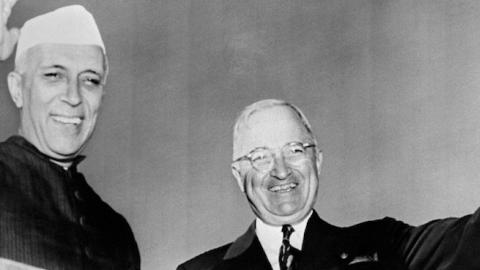Some Indians were shocked when they read recently declassified CIA cables describing India in derogatory terms. A September 1973 National Intelligence Service ‘India: Country Profile’ report spoke of India’s sense of “national inferiority” and attributed it to their “subjugation” under “Muslims” and “British.” Indians try to offset this inferiority complex by appearing “offensive, assertive, vain and arrogant.”
This view of Indians as vain, undependable and untrustworthy and India as an unnatural country, torn apart by Hindu-Muslim tensions seems out of place in an age when India is seen by Americans as a stable, secular and democratic country that will be a crucial partner for the United States in the twenty-first century. But through most of the second half of the twentieth century, American officials saw India through the eyes of British colonial officers.
The dismissive language about India and Indians in recently release cables also reflected the emerging national narrative of America’s formal ally in South Asia, Pakistan. Pakistani elites had accepted the prejudices nurtured by the British Raj both to justify their nationhood and to curry favor with the British and the Americans during the Cold war.
While Pakistan joined U.S.-sponsored anti-communist military alliances, India opted for non-alignment. This contributed significantly to U.S. officials embracing the negative image of India cultivated by Pakistan and its British mentors.
U.S. President Franklin Delano Roosevelt had championed India’s independence from British colonial rule, disagreeing with his ally Sir Winston Churchill who did not consider the Indian subcontinent ready for independence. Churchill argued that the “finest achievement” of British history was the “rescue of India from ages of barbarism, tyranny, and internecine war,,+tyranny and its slow but ceaseless forward march to civilization.”
For Churchill, a withdrawal of British rule would either lead to “Hindu despotism” or renewal of “ferocious internal wars.” This belief that Indian leaders did not know what was good for them and that there was an inevitability of Hindu-Muslim (later India-Pakistani) conflict necessitated the need for British guidance. Imperial policy was justified both as a civilizing mission as well as one that kept the subcontinent from breaking apart due to communal or ethnic differences.
The ‘White Man’s Burden’ was reflected in the British view of the subcontinent both before and after Partition in 1947. Maintaining control of India was deemed crucial to sustaining Pax Britannia across the world. Once independence became inevitable, India’s unwillingness to get embroiled in the Cold War became grounds for embracing Pakistan as a Muslim nation of ‘martial races’ and to look down upon non-aligned India.
British strategists had always considered colonial India as critical to the British Empire because of its location and the large British Indian army. The 1938 and 1939 Committees of Imperial Defense argued that colonial India was “the most suitable area east of the Mediterranean in which to station reserves for the Middle and Far East.”
The 1939 committee attempted to meet prominent Indian politicians to obtain their views on military expenditure and role of the military. The Indian National Congress led by Mohandas Karamchand Gandhi and Jawaharlal Nehru rebuffed the meeting request whereas the Muslim League led by Muhammad Ali Jinnah met with the committee.
The committee’s report thus stated “if a Hindu majority came to power, it would drastically change military policy since defense strategy and expenditure would leave British hands for the first time.” This view that the ‘Hindu’ Congress would be worse for British interests than the ‘Muslim’ League influenced British views of the Indian independence struggle and how British officials viewed the subcontinent after 1947.
The perception that Indians were vain, impractical and difficult to work with and hence not good allies whereas Pakistanis are friendly, practical and eager to be friends was passed on from the British to their special friends, the Americans.
President Harry Truman and his top diplomats viewed Indian leaders especially Prime Minister Jawaharlal Nehru as “vain, sensitive and emotional.” Truman’s Secretary of state, Dean Acheson records in his memoirs that “I have never been able to escape wholly from a childhood illusion that, if the world is round, the Indians must be standing on their heads-or, perhaps, vice versa.”
In contrast George McGhee, assistant secretary of state for Near Eastern, South Asian, and African affairs, was impressed with Prime Minister Liaquat Ali Khan because he “was a big, strong, confident man with considerable international stature,” whom “you could do business with.”
According to a State Department profile, Liaquat’s characteristics included "calmness, imperturbability, industry, energy, [and] perseverance.”
Truman’s successor Dwight Eisenhower saw South Asia as “one area of the world where, even more than most cases, emotion rather than reason seems to dictate policy.” In a letter to Secretary of State John Foster Dulles dated March 23, 1955 President Eisenhower writes: “In the Indian situation I am struck by the amount of evidence we have that Nehru seems to be often more swayed by personality than by logical argument. He seems to be intensely personal in his whole approach.”
On his tour of South Asia in 1961, Vice President Lyndon Johnson wrote to President John F Kennedy that Pakistan’s military dictator Field Marshal Ayub Khan was “seasoned as a leader; confident, straightforward and I would judge dependable."
Pakistan did not always fulfill American expectations and Johnson was disappointed by Ayub when he went to war with India in 1965, developed close ties with China, and shut down the U.S. spy station near Peshawar. But during the 1971 civil war in Pakistan, President Richard Nixon justified his tilt towards Pakistan by telling British Foreign Secretary Douglas-Home that the British should not have left the subcontinent because India and Pakistan “just aren't ready” to be independent countries.
That U.S. perceptions of India were based on misinformed prejudices is obvious from the 1973 National Intelligence Survey, which says that in India “friction between the majority Hindu population and the minority Muslims has influenced politics for 900 years.”
The suggestion that India’s Hindus and Muslims have been in conflict since 1073 AD is eerily similar to history textbooks in Pakistan that claim that the creation of Pakistan dates back to the invasion of Sindh by Arab-Umayyad commander Muhammad Bin Qasim in 712 AD.
Thankfully, these distortions are diminishing as India and the United States overcome their differences of the Cold War era and the belief of many in the West that India would not survive as a unified state. Political scientists like Samuel Huntington had more faith in Pakistan, its authoritarian system and its attempts at enforced homogeneity than they had in India’s experiment with democracy and diversity.
As the India-U.S. partnership intensifies, and Pakistan is increasingly viewed as a problem state, it is important to remember that Americans –be they academics like Huntington, Presidents like Nixon or intelligence analysts writing the National Intelligence Survey –can misunderstand a country like India because of what they hear from others. The Raj ended in 1947 but its shadow impeded cordiality between the world’s oldest and largest democracies for several decades.



















